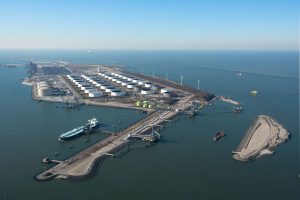Gate terminal: access gateway for global supply of LNG
 Gate terminal is Europe’s LNG hub – a professional access gateway for LNG that is supplied from across the world. The import terminal on Maasvlakte in Rotterdam contributes to the natural gas supply in the Netherlands and Northwest Europe. Gate terminal receives LNG for its customers, stores it, regasifies it and then supplies it to the gas transport network for distribution to households and industry.
Gate terminal is Europe’s LNG hub – a professional access gateway for LNG that is supplied from across the world. The import terminal on Maasvlakte in Rotterdam contributes to the natural gas supply in the Netherlands and Northwest Europe. Gate terminal receives LNG for its customers, stores it, regasifies it and then supplies it to the gas transport network for distribution to households and industry.
Liquefied Natural Gas (LNG) is a clear, colourless liquid created when natural gas is cooled to -162°C. In liquid form, LNG occupies approximately 600 times less volume than standard natural gas, which enables it to be stored and transported very efficiently. LNG is a good alternative to gas transport via pipelines, particularly for transportation over long distances.
LNG is also used as fuel for vessel and lorries, as a replacement for diesel and heavy fuel oil. At Gate terminal, LNG is loaded into bunkering vessels or trucks that supply other vessels with fuel.
This first Dutch LNG import terminal has been operational since 2011 and has an annual throughput capacity of 12 billion m3 of gas per year. The Gate terminal capacity covers approximately a third of the national gas consumption. The terminal has three storage tanks, three jetties, three loading sites for lorries and an area in which LNG is converted into natural gas. Nederlandse Gasunie and Royal Vopak are initiators and partners in Gate terminal.
Why LNG?
The production of natural gas is decreasing in the Netherlands and Northwest Europe, while demand is increasing. This means that society will still need LNG for many years, as long as other energy sources are insufficiently available to meet energy demand. Although LNG is a fossil fuel, it is one of the most environmentally friendly. Lorries running on LNG are quieter, have lower CO2 emissions and cause almost no air pollution through particulate, nitrogen oxide or sulphur oxide emissions. LNG is therefore a promising choice for the transition to cleaner transport.
Research is currently being conducted into the production of bio-LNG (Liquefied Bio Methane), a logical step to more sustainable solutions. LNG will then be produced from waste streams, such as waste, fertiliser and sludge. Biomass is converted into biogas, before being reprocessed into green gas and cooled to bio-LNG. This reduces CO2 emissions to a minimum and may even be carbon positive in certain cases.
Why Gate terminal?
Customers value our reliable and flexible services. Our expert staff work every day from a safe working environment to cater for our business relations’ schedules and requirements. Rotterdam is an efficient location for an LNG import terminal: with excellent accessibility for LNG carriers, all necessary support and handling facilities are within easy reach in the port and the Dutch natural gas network has excellent connections.
